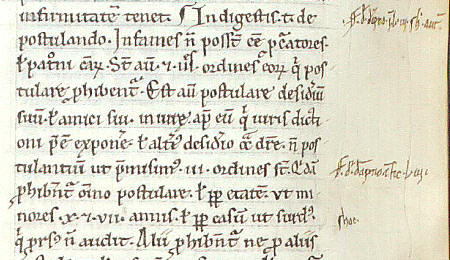|
Huguccio, Summa to C. 3 q. 7 c. 2, Lons-le-Saunier, fol. 170va: "patroni," idest "aduocati." Hec uerba sunt Gratiani, set deinceps sunt uerba legis, licet Gratianus quandoque ea mutet uel sua interserit." "Patrons," that is, "advocates." These words are Gratian's, but following are the words of the law, although Gratian sometimes changes or inserts his own words." Gratian, Decretum K÷ln, Erzbisch÷fliche Di÷zesan- und Dombibliothek 128, fol. 111v |
In digestis tit. De postulando [Dig. 3.1.1]. Infames non possunt esse procuratores uel patroni causarum. Sunt autem tres ordines eorum, qui postulare prohibentur. Est autem postulare desiderium suum uel amici sui in iure apud eum, qui iurisdictioni preest, exponere, uel alterius desiderio contradicere. Non postulantium, ut premisimus, tres ordines sunt. Quidam prohibentur omnino postulare uel propter etatem, ut minores decem et septem annis, uel propter casum, ut surdus, qui prorsus non audit. ("Infames" cannot be procurators or patrons of legal cases. There are three classes of "infames" who are prohibited. "Postulare" means the right of a person to present his own petition or that of a friend to enter a plea in a legal case to a judge who has jurisdiction over the matter. It means to present one's own case or to refute the claims of another. There are, as we have said, three classes who cannot petition. Some are completely prohibited, some on account of their age, as minors of 17, or on account of condition, as a person who completely cannot hear). Gratian, C.3 q.7 d.p.c.1 |
